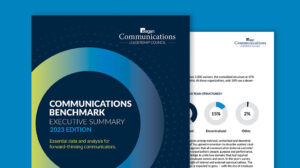Communicators reveal work perk preferences and employer attributes
Which workplace facets attract top talent, and what aspects of the job drive long-term employee satisfaction? Read on for crucial retention insights.

Good pay and benefits are great, but there are other key factors that determine whether communicators like their jobs, a new survey reveals.
When asked “What are the most satisfying aspects of your job?” PR pros most frequently answered challenging work (56%), organizational mission/integrity (50%), and freedom to pursue new ideas/projects (48%), according to Ragan’s 2020 Salary and Workplace Culture Survey.
Other satisfying facets of jobs included a collegial work environment, wonderful bosses and workplace location.
Most PR pros (82%) agreed that the most important employer attribute is organizational mission/integrity. Other top employer attributes include diversity and inclusion and strong corporate social responsibility (CSR) programs.
The results confirm the immense recruiting and retention value of establishing a strong company reputation and a well-defined, compelling corporate mission. Younger workers, especially, prefer to work for socially responsible organizations—and they prefer to purchase products from and invest in companies with socially responsible reputations.
PR salaries and benefits
More than half of PR pros reported salary increases of 1 to 3% within the past year. Almost a quarter received raises of 4 to 7%. Men reported an average base salary of $102,359 and women, $94,319.
Benefits are also a crucial engagement factor—but employers should choose wisely. Almost all organizations provide medical insurance and vacation time. Most also offer dental and vision insurance and sick time. Such traditional benefits are now mere table stakes to retain qualified personnel.
Many organizations offer more creative benefits. According to the survey, two-thirds pay for professional development or conferences, and two-thirds allow work-from-home arrangements. Just 55% permit flexible work hours (although 62% do offer free coffee and tea).
Despite some areas needing improvement, most PR pros feel satisfied with their jobs overall, the survey shows.
However, Arik Hanson, principal of ACH Communications, says employers are not doing enough to attract and retain top employees. A lack of widespread professional development is particularly disconcerting.
“I’m constantly amazed in talking to friends and colleagues that companies refuse to pay for PRSA, IABC and MIMA memberships,” Hanson writes in his blog. In addition, most PR firms are unwilling to fund trips to professional development conferences.
“It’s time to start taking professional development seriously. It’s not a ‘nice to have’–it’s a must have,” he says. “This data is reinforcing what we already knew.”
It’s also perplexing why more companies don’t allow employees to work from home. Telecommuting may not be for everyone, but research indicates that telecommuters are happier, healthier and more productive.
Although the remote work benefit is easy to provide, many companies are struggling to adapt to telecommuting culture, Hanson says. Execs may not trust their employees to work efficiently or effectively from home—or they simply don’t want to relinquish control. Either way, they could be missing an opportunity to boost productivity and morale, all while reducing office space and real estate costs.
Telecommuting continues to spread
Despite lingering employer concerns, telecommuting will increase significantly this year due to widespread coronavirus fears.
Work-at-home arrangements, not counting the self-employed, have increased 173% since 2005, 11% faster than the rest of the workforce and nearly 47 times faster than the self-employed population, according to Global Workplace Analytics.
In addition, the number of PR pros with flexible work arrangements has increased over time, according to a PRWeek/Bloom, Gross & Associates survey released last year.
The flexible scheduling trend isn’t going anywhere but up, so employers keen on keeping top talent should adjust their policies accordingly.
Michael Kling is manager of PR, marketing and social media at Glean.info.






